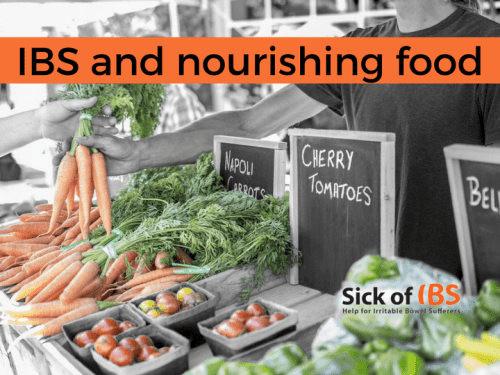If you have IBS, you need a particularly nourishing diet. But that can be really complicated when you have food intolerance.
Eating food is supposed to be a pleasure – but also something that nourishes our body, keeping us balanced and healthy. When IBS makes digestion difficult, we actually should be especially careful about the quality of our diet, as well as choosing the foods we digest the best.
In our grandparent’s day, nourishing food was easy to find. People had allotments and grew their own fruit and veg. And what you could buy at the local market or in shops was organic and local, well before we had to make up the certified organic label.
While research has shown that the foods we are consuming today are less nutritious than back then, we do have access to a much wider variety of foods today. So it is up to us to choose our food well and pay attention to our diet.
There are a few basics that you need to keep in mind about choosing and eating a nourishing diet with IBS:
1) What you see is NOT what you get
A salad at McDonald’s has nothing like the same nutritional value as a home-grown lettuce that you pick, wash and eat. It looks like the same thing, but it isn’t.
Hands up all of you who have time to grow veg in their garden? I bet not many hands go up. The way we work and live today makes this almost impossible. I don’t grow my own veg either, by the way.
A good alternative is finding local growers who are passionate about the quality of their products and sell them direct, or on a local market. Many of these are careful about using pesticides and chemical treatments and can advise you how to best consume their products.
2) Don’t leave food hanging around
If you buy veg and keep it in the fridge for a week, you have lost all the vital nutrients.
This means making a conscious effort to plan to shop for fresh foods more often.
On the same note, if you have some freshly made fruit salad that has been sitting around in the canteen, it will have lost most of its vitamins (but not the fibre) by the time you eat it. So preparing then eating is essential.
3) Go for local and organic – and in season
There’s no point buying organic pears that have come from the other side of the planet. By the time you have bought them, there is very little or no vital energy left in them.
4) How you cook food matters
Raw foods are not easy to digest for IBS sufferers. So go for lightly steamed veg, and try using some of the veg water in your gravy. It gives flavour and adds some of the lost nutrients back into your food. (Don’t do this with green beans as the water will make your gravy bitter).
5) Anything ready prepared and reheated is never as nourishing as something you made from scratch.
Plus it often contains additives and preservatives that can be irritating your gut.
So how do you go from your usual eating habits to a more nourishing diet?
I would say little by little. Habits take time to change. You are not going to be able to make a meal from scratch easily for every meal. But whatever progress you do make will help your general wellbeing, your IBS, and energy levels over time.
If you never cook from scratch, making even one nourishing meal at weekends is a step in the right direction..
Realizing what you are eating is a major first step. And how much a nourishing diet can make a difference for your health and IBS. Just this week I had a cold and couldn’t be bothered to cook. So I had a ready meal for lunch and then pizza for tea. Just how was my body going to get over the cold with that as fuel? So the next day I made some soup from fresh veg – and started feeling more energetic.
As ever, balance is key. For every “low nourishment” meal you eat, plan a nourishing one, or even a nourishing snack (on nuts or raw goat’s cheese for example, if fruit is an issue). And do stay with the foods you tolerate the best. As I have said in a previous article on IBS, digestion is essential. You are what you digest.
3
